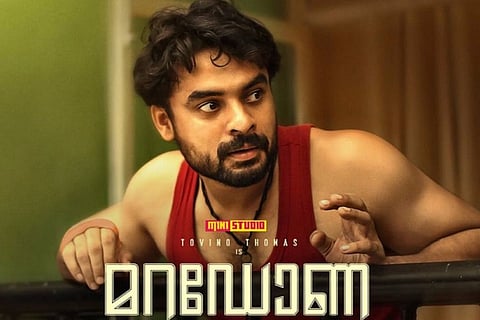

Vishnu Narayan's Maradona is yet another film that marks the slow shift in the depiction of masculinity on screen in Malayalam cinema. Even though the two superstars, Mammootty and Mohanlal, have both always played a wide variety of roles, their larger than life image was partly constructed through a celebration of unapologetic male aggression.
While the two veterans continue to do films that depict them as "mass" heroes, the younger generation appears to be moving away from such populist pandering and trying out films that redefine what masculinity should be. The credit for this should also go to contemporary writers and directors in the industry who appear to have recognised that toxic masculinity should be represented as such and not validated through glorification.
In Maradona, Tovino Thomas plays a thug who indulges in acts of violence, sometimes on the job and sometimes because he gets pleasure out of it.
His childhood friend, Sudhi (Tito Wilson), is his fellow gangster and together, the two of them make a ruthless pair. We don't know much about Maradona and why he is the way he is - from sadistically twisting a child's hands to drive home a message to her parents, to abusing a pet dog, Maradona is repulsive when he goes full throttle.
With a remarkably expressive face, Tovino is very believable, whether he's romancing the girl-next-door (literally) or breaking people's legs. We get only flashes of his childhood, memories he shares with Sudhi. What made this boy, who loved football (that explains his name, we're never told what the real one is), give up the sport and turn towards violence? We don't know. There's no sob story to justify his aggression and this, in itself, is an interesting choice on part of the filmmaker.
From his girlfriend (Sharanya Nair) giving gyan about how it's the women who brought India Olympics medals, even in wrestling, with their productive aggression, to a neighbour who chooses not to hit back when his lover's family beats him up, there are many life lessons that Maradona learns on violence. With Tovino's muscular frame, the fight scenes could have easily been structured to glorify him as the hero - but that's not what the film wants to do. He gets hurt as does Sudhi - they have regrets, they feel the pain of having let people down, they wish they could turn their lives around.
In fact, the one scene where Maradona performs a "heroic" act has nothing to do with aggression, it has to do with protection. The Maradona who once wanted to trap a pigeon and roast it, risks his life and conquers his fear of heights, to save a nest from tumbling down. It may strike one as an unnecessarily dramatic moment but the scene is not about the birds alone - it marks a distinct shift within Maradona.
Maradona, like an increasing number of Malayalam films in recent times, valorizes love, forgiveness, and repentance over revenge and bloodthirst. And encouragingly, these messages come to us from women characters - not in saccharine, overly sentimental tones, but with honesty. Like the mothers in Sudani from Nigeria who are vocally compassionate, eventually leading to Majeed's healing (Soubin Shahir), it is a mother's forgiveness in Maradona that gives him a sense of closure.
In his previous film Mayaanadhi, directed by Aashiq Abu, Tovino played a criminal on the run. But despite his violence and unstable ways, the love he shares with Appu (Aishwarya Lekshmi) tethers him, making him want to move away from the terrible things he does for a living. Here too, Mathan is never boosted as a hero - he is flawed and the narrative does not try and make him 'stylish' or worthy of emulation.
Anjali Menon's Koode saw Prthiviraj play Joshua, a survivor of child sexual abuse, who is weighed down by family responsibilities. At every turn in the film, whenever we expect the hero to break out and land punches, he withdraws from the fight before it even begins. It is through his sister Jenny (Nazriya) and his childhood love Sophie (Parvathy) that he learns to let go off the past, forgive his family, and move on.
Even in campus films, where violence is usually celebrated as cool, there is a change. Ganesh Raj's Aanandam and Abrid Shine's Poomaram, both had level-headed protagonists who ultimately shunned violence and chose peace. Aanandam even had Renji Panicker (who is famous for writing blustering lines for the hero in his films) playing a man who does not badmouth his ex-wife to his daughter, despite the fact that she chose to leave him.
While there are several Malayalam films which continue to have "mass" moments for their heroes, the current crop of stars appears to be invested in doing films that are about the roles and not them. Dulquer Salmaan, Nivin Pauly, Fahadh Faasil, Jayasurya, Tovino Thomas, and others have all done films where their characters don't fall neatly into the stereotypical hero mould. If more directors and writers are willing to overturn their notions of masculinity and what "being a man" means on screen, we're looking at a promising future, as far as art and its influence on society goes.